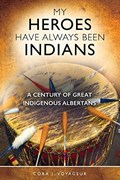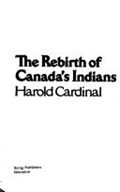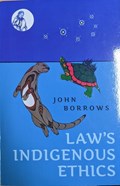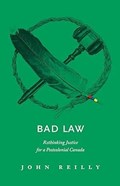Narrow Results By
Nako´n-i'a wo! = Beginning Nakoda
https://archives.whyte.org/en/permalink/catalogue25060
- Medium
- Library - Book (including soft-cover and pamphlets)
- Published Date
- 2019
- Author
- McArthur, Armand (author)
- Kennedy, Wilma (author)
- Collette, Vincent (editor)
- Publisher
- Regina, Saskatchewan : University of Regina Press
- Call Number
- 07.2 C67n copy 1
- 07.2 C67n copy 2 reference
1 website
- Publisher
- Regina, Saskatchewan : University of Regina Press
- Published Date
- 2019
- Physical Description
- 252 pages
- Subjects
- First Nations
- Languages
- Guidebook
- Education
- Abstract
- Written for beginning learners of Nakoda (also known as Assiniboine), this workbook, arranged thematically, provides a Nakoda/English lexicon, a vocabulary, a table of kinship terms, a glossary of linguistic terminology, and exercises to do after each lesson. This book was made possible with the assistance of Elders and Language Keepers of the Nakoda Nation: Armand McArthur and Wilma Kennedy, Main Consultants; with additional contributions by Pete Bigstone, Leona Kroscamp, Freda O'Watch, and Ken Armstrong. (from University of Regina Press website)
- ISBN
- 9780889776623
- Accession Number
- P2020-1
- Call Number
- 07.2 C67n copy 1
- 07.2 C67n copy 2 reference
- Collection
- Archives Library
- URL Notes
- Summary on University of Regina Press website
Websites
This material is presented as originally created; it may contain outdated cultural descriptions and
potentially offensive content.
Read more.
My heroes have always been Indians : a century of great Indigenous Albertans
https://archives.whyte.org/en/permalink/catalogue25267
- Medium
- Library - Book (including soft-cover and pamphlets)
- Published Date
- 2018
- Author
- Voyageur, Cora J.
- Publisher
- Edmonton, Alberta : Brush Education Inc.
- Call Number
- 07.2 V85m
1 website
- Author
- Voyageur, Cora J.
- Responsibility
- Cora J. Voyageur
- Publisher
- Edmonton, Alberta : Brush Education Inc.
- Published Date
- 2018
- Physical Description
- 226 pages
- Subjects
- Anthropology
- First Nations
- History
- Biography
- Alberta
- Abstract
- In a series of inspirational profiles, Cora Voyageur celebrates the achievements of 100 remarkable Indigenous Albertans in the fields of art, literature, business, politics, sports, education, human rights and more. From world-renowned architect Douglas Cardinal, whose iconic designs are seen from Edmonton to Washington, DC, to Nellie Carlson, a tireless activist whose work has advanced the rights of Indigenous women, the contributions of Indigenous Peoples have greatly enriched the social, cultural and economic fabric of Alberta. An introduction provides a brief history of Indigenous Peoples in Alberta, including an explanation of the Numbered Treaties. (from publisher's website)
- ISBN
- 9781550597547
- Accession Number
- P2020.08
- Call Number
- 07.2 V85m
- Collection
- Archives Library
- URL Notes
- Publisher's website
Websites
This material is presented as originally created; it may contain outdated cultural descriptions and
potentially offensive content.
Read more.
Indigenous peoples of North America : a concise anthropological overview
https://archives.whyte.org/en/permalink/catalogue25265
- Medium
- Library - Book (including soft-cover and pamphlets)
- Published Date
- 2012
- Author
- Muckle, Robert J.
- Publisher
- Toronto : University of Toronto Press
- Call Number
- 07.2 M88i
1 website
- Author
- Muckle, Robert J.
- Responsibility
- Robert J. Muckle
- Publisher
- Toronto : University of Toronto Press
- Published Date
- 2012
- Physical Description
- xviii, 198 pages : illustrations, maps
- Subjects
- Anthropology
- First Nations
- History
- Archaeology
- Abstract
- Most books dealing with North American Indigenous peoples are exhaustive in coverage. They provide in-depth discussion of various culture areas which, while valuable, sometimes means that the big picture context is lost. This book offers a corrective to that trend by providing a concise, thematic overview of the key issues facing Indigenous peoples in North America, from prehistory to the present. It integrates a culture area analysis within a thematic approach, covering archaeology, traditional lifeways, the colonial era, and contemporary Indigenous culture. Muckle also explores the history of the relationship between Indigenous peoples and anthropologists with rigor and honesty. The result is a remarkably comprehensive book that provides a strong grounding for understanding Indigenous cultures in North America (from publisher's website)
- Contents
- Situating the indigenous peoples of North America -- Studying the indigenous peoples of North America through the lens of anthropology -- Comprehending North American archaeology -- Studying population, languages, and cultures in North America as they were at AD 1500 -- Overview of traditional lifeways -- Understanding the colonial experience -- Contemporary conditions, nation-building, and anthropology -- Epilogue : final comments -- Appendices: The United Nations declaration on the rights of indigenous peoples ; Excerpts from the code of ethics of the American Anthropological Association (2009) ; Excerpts from the Native American Graves Protection and Repatriation Act (1990) ; Excerpts from the Royal Proclamation of 1763 ; Apology for residential schools ; Apology to the native peoples of the United States ; Studying indigenous peoples of North America.
- ISBN
- 9781442603561
- Accession Number
- P2020.08
- Call Number
- 07.2 M88i
- Collection
- Archives Library
- URL Notes
- Publisher's website
Websites
This material is presented as originally created; it may contain outdated cultural descriptions and
potentially offensive content.
Read more.
Indigenous identity formation in post-secondary institutions : I found myself in the most unlikely place
https://archives.whyte.org/en/permalink/catalogue25266
- Medium
- Library - Book (including soft-cover and pamphlets)
- Published Date
- 2020
- Author
- Barnes, Barbara G.
- Voyageur, Cora J.
- Publisher
- Edmonton, Alberta : Brush Education Inc.
- Call Number
- 07.2 B26i
1 website
- Responsibility
- Barbara G. Barnes
- Cora J. Voyageur
- Publisher
- Edmonton, Alberta : Brush Education Inc.
- Published Date
- 2020
- Physical Description
- 132 pages
- Subjects
- Anthropology
- First Nations
- History
- Abstract
- This book presents a study conducted between 2005 and 2010 of 60 self-declared Indigenous university students from western Canada. The study explored Indigenous identity formation among these students through these central research questions:
- Do conventional definitions of identity, and conventional identity formation theories, offer ways to understand the identity of these Indigenous students?
- What role, if any, does postsecondary education play in the formation and/or confirmation of the identity of Indigenous students as Indigenous individuals? The study is unique for two reasons. First, little scholarly attention has been paid to Indigenous individuals’ sense of identity. While the literature and research on identity is diverse, it mostly focuses on Eurocentric definitions of identity. Second, this study emphasizes Indigenous identity formation in postsecondary institutions. This book moves beyond a simple understanding of Indigenous students’ concept of identity and delves into determining the role a university education can play in the development of an Indigenous individual’s identity (from publisher's website)
- Contents
- Preface and dedication
- Acknowledgements
- Introduction
- Find the self: a history of defining Indigenous identity in Canada
- Conventional and Indigenous concepts of identity
- A history of Indigenous education in Canada
- Who were the participants?
- Identity and Blumer's symbolic interactionism: definitions and participant responses
- Identity and Mihesuah's Native identity development theory: definition and participant responses
- The university experience
- Building on Mihesuah: a Canadian Indigenous identity formation model
- References
- About the authors
- ISBN
- 9781550598544
- Accession Number
- P2020.08
- Call Number
- 07.2 B26i
- Collection
- Archives Library
- URL Notes
- Publisher's website
Websites
This material is presented as originally created; it may contain outdated cultural descriptions and
potentially offensive content.
Read more.
The rebirth of Canada's Indians
https://archives.whyte.org/en/permalink/catalogue25275
- Medium
- Library - Book (including soft-cover and pamphlets)
- Published Date
- 1977
- Author
- Cardinal, Harold
- Publisher
- Edmonton : Hurtig Publishers
- Call Number
- 07.2 C11t
1 website
- Author
- Cardinal, Harold
- Responsibility
- Harold Cardinal
- Publisher
- Edmonton : Hurtig Publishers
- Published Date
- 1977
- Physical Description
- 222 pages
- Abstract
- The story of the Indian peoples' fight for justice through the tunnels and mazes of bureaucracy. An affirmation of the Indian way of life, of the Indian religion, and a demand for acceptance of the Alberta proposal for a new Indian Act. Chapters cover the Indian Act, Indian organization, education, economic development and aboriginal rights. (from LAC entry)
- Contents
- A Canadian - what the hell it's all about
- Make love not war - the changing role of Indian organizations
- Organize or else - it's not enough to find a bad guy
- The politics of poverty - how to survive in the democratic system
- Economic development I - without all the crap and mythology
- Economic development II - some of teh nitty is pretty gritty
- Education I - with our heads in the clouds
- Education II - always the prime topic
- Education III - strangers in the classroom
- Education IV - the need for legislation and funding
- The Indian Act I - government by a bunch of bureaucrats, or Her Majesty pulled a fast one
- The Indian Act II - moose meat beats bologna
- The Indian Act III - time to get down to specifics
- The Indian Act IV - to serve the people, not the government
- The Indian Act V - the only good indian is a sleeping indian
- Aboriginal rights - from a philosophical, religious viewpoint
- The Treaties - the Queen's forked tongue
- The claims - our children won't wait
- Indian organization I - they breathe the same air; they drink the same water
- Indian organizations II - we forgot to scalp the general
- Indian organizations III - the war continues - Chretien rises from the dead
- Integration and alienation - education and our childres
- Earmarked for Indian education - raindrops kept falling on their heads
- The education ferment - Cold Lake stands firm
- A hell of a mess - no problem is insoluable
- Wood, grass, stone - despair and rebirth
- ISBN
- 0888301251
- Accession Number
- P2020.07
- Call Number
- 07.2 C11t
- Collection
- Archives Library
- URL Notes
- Author information
Websites
This material is presented as originally created; it may contain outdated cultural descriptions and
potentially offensive content.
Read more.
Law's indigenous ethics
https://archives.whyte.org/en/permalink/catalogue25268
- Medium
- Library - Book (including soft-cover and pamphlets)
- Published Date
- 2019
- Author
- Borrow, John
- Publisher
- Toronto ; Buffalo ; London : University of Toronto Press,
- Call Number
- 07.2 B63l
1 website
- Author
- Borrow, John
- Responsibility
- John Borrow
- Publisher
- Toronto ; Buffalo ; London : University of Toronto Press,
- Published Date
- 2019
- Physical Description
- viii, 381 pages
- Subjects
- First Nations
- History
- Treaties
- Education
- Politics
- Abstract
- Law's Indigenous Ethics examines the revitalization of Indigenous peoples' relationship to their own laws and, in so doing, attempts to enrich Canadian constitutional law more generally. Organized around the seven Anishinaabe grandmother and grandfather teachings of love, truth, bravery, humility, wisdom, honesty, and respect, this book explores ethics in relation to Aboriginal issues including title, treaties, legal education, and residential schools. With characteristic depth and sensitivity, John Borrows brings insights drawn from philosophy, law, and political science to bear on some of the most pressing issues that arise in contemplating the interaction between Canadian state law and Indigenous legal traditions. In the course of a wide-ranging but accessible inquiry, he discusses such topics as Indigenous agency, self-determination, legal pluralism, and power. In its use of Anishinaabe stories and methodologies drawn from the emerging field of Indigenous studies, Law's Indigenous Ethics makes a significant contribution to scholarly debate and is an essential resource for readers seeking a deeper understanding of Indigenous rights, societies, and cultures. (from publisher's website)
- Contents
- Introduction -- Nitam-Miigiwewin : Zaagi'idiwin (gift one : love) ; Love : law and land in Canada's indigenous constitution -- Niizho-Miigiwewin : Debwewin (gift two : truth) ; Truth : origin stories, metaphysics, and law -- Niso-miigiwewin : Zoongide'iwin (gift three : bravery) ; Bravery : challenging the durability of terra nullius : Tshilhqot'in v British Columbia -- Niiyo-Miigiwewin : Dabaadendizowin (gift four : humility) ; Humility : entanglement, aboriginal title, and "private" property -- Naano-Miigiwewin : Nibwaakaawin (gift five : wisdom) ; Wisdom : outsider education, indigenous law, and land -- Ningodwaaso-Miigiwewin : Gwayakwaadiziwin (gift six : honesty) ; Honesty : legal education and heroes, tricksters, monsters, and caretakers -- Niizhwaaso-Miigewewin : Manaaji'idiwin (gift seven : respect) ; Respect : residential schools, responsibilities for past harms -- Conclusion: Nookomis's reconstitution.
- ISBN
- 9781487523558
- Accession Number
- P2020.08
- Call Number
- 07.2 B63l
- Collection
- Archives Library
- URL Notes
- Publisher's website
Websites
This material is presented as originally created; it may contain outdated cultural descriptions and
potentially offensive content.
Read more.
Bad medicine : a judge's struggle for justice in a First Nations community - revised & updated
https://archives.whyte.org/en/permalink/catalogue25142
- Medium
- Library - Book (including soft-cover and pamphlets)
- Published Date
- 2010
- Author
- Reilly, John
- Publisher
- Surrey, B.C. : Rocky Mountain Books
- Edition
- First Edition - revised & updated
- Call Number
- 07.2 R27b 2019
1 website
- Author
- Reilly, John
- Edition
- First Edition - revised & updated
- Publisher
- Surrey, B.C. : Rocky Mountain Books
- Published Date
- 2010
- Physical Description
- 261 p. : map
- Subjects
- Crime
- Education
- Morley
- Snow, John
- Stoney Nakoda
- First Nations
- Contents
- This revised and updated edition details the latest legal developments surrounding tribal leadership and the state of governance on Canadian reserves. When Bad Medicine first appeared in 2010 it was an immediate sensation, a Canadian bestseller that sparked controversy and elicited praise nationwide for its unflinchingly honest portrayal of tribal corruption in a First Nation in Alberta. Now, in a new, revised and updated edition, retired Alberta jurist John Reilly sketches the latest legal developments surrounding tribal leadership at Morley and the state of governance on Canadian reserves, as well as national developments such as Canada’s long-delayed assent to the United Nations Declaration on the Rights of Indigenous Peoples, currently wending its way through the Senate, and the final report of the Truth and Reconciliation Commission. Early in his career, Judge John Reilly did everything by the book. His jurisdiction included a First Nations community plagued by suicide, addiction, poverty, violence and corruption. He steadily handed out prison sentences with little regard for long-term consequences and even less knowledge as to why crime was so rampant on the reserve in the first place. In an unprecedented move that pitted him against his superiors, the legal system he was part of, and one of Canada’s best-known Indian chiefs, the Reverend Dr. Chief John Snow, Judge Reilly ordered an investigation into the tragic and corrupt conditions on the reserve. A flurry of media attention ensued. Some labelled him a racist; others thought he should be removed from his post, claiming he had lost his objectivity. But many on the Stoney reserve hailed him a hero as he attempted to uncover the dark challenges and difficult history many First Nations communities face. (From Rocky Mountain Books website)
- Notes
- Includes bibliographical references (p. 257-258) and index. The Stoney people are comprised of three bands: the Wesley First Nation, the Chiniki First Nation and the Bearspaw First Nation
- Accession Number
- P2020-6
- Call Number
- 07.2 R27b 2019
- Collection
- Archives Library
- URL Notes
- Publication on Rocky Mountain Book's website
Websites
This material is presented as originally created; it may contain outdated cultural descriptions and
potentially offensive content.
Read more.
Bad law : rethinking justice for a postcolonial Canada
https://archives.whyte.org/en/permalink/catalogue25143
- Medium
- Library - Book (including soft-cover and pamphlets)
- Published Date
- 2019
- Author
- Reilly, John
- Publisher
- [Victoria, British Columbia] : Rocky Mountain Books
- Edition
- First edition
- Call Number
- 07.2 R27bl
1 website
- Author
- Reilly, John
- Responsibility
- John Reilly
- Edition
- First edition
- Publisher
- [Victoria, British Columbia] : Rocky Mountain Books
- Published Date
- 2019
- Physical Description
- 231 pages
- Abstract
- From the bestselling author of Bad Medicine and its sequel Bad Judgment comes a wide-ranging, magisterial summation of the years-long intellectual and personal journey of an Alberta jurist who went against the grain and actually learned about Canada’s indigenous people in order to become a public servant. ”Probably my greatest claim to fame is that I changed my mind,” writes John Reilly in this broadly cogent interrogation of the Canadian justice system. Building on his previous two books, Reilly acquaints the reader with the ironies and futilities of an approach to justice so adversarial and dysfunctional that it often increases crime rather than reducing it. He examines the radically different indigenous approach to wrongdoing, which is restorative rather than retributive, founded on the premise that people are basically good and wrongdoing is the aberration, not that humans are essentially evil and have to be deterred by horrendous punishments. He marshalls extensive evidence, including an historic 19th-century US case that was ultimately decided according to Sioux tribal custom, not US federal law. And then he just comes out and says it: “My proposition is that the dominant Canadian society should scrap its criminal justice system and replace it with the gentler, and more effective, process used by the indigenous people.” Punishment; deterrence; due process; the socially corrosive influence of anger, hatred and revenge; sexual offences; the expensive futility of “wars on drugs”; the radical power of forgiveness—all of that and more gets examined here. And not in a bloodlessly abstract, theoretical way, but with all the colour and anecdotal savour that could only come from an author who spent years watching it all so intently from the bench. (From Rocky Mountain Books website)
- Contents
- The beginning -- Learning -- Getting to know the Stoneys -- Restorative justice -- The origins of processes -- The evil Cornwallis -- Milton Born With a Tooth -- The right thing -- Respect -- Paradigm change -- Crow Dog v. Spotted Tail -- Rupert Ross -- Punishment -- Deterrence -- Due process -- Sawbonna -- Rev. Dale Lang -- To forgive or not to forgive -- Anger, hatred, vengeance -- Advocacy vs. conversation -- Polarization -- Drug prohibitions -- Sexual offences -- One size fits all -- Shifting focus from judicial solutions to community solutions -- The TRC -- FAQ.
- ISBN
- 9781771603348
- Accession Number
- P2020-6
- Call Number
- 07.2 R27bl
- Collection
- Archives Library
- URL Notes
- Publication on Rocky Mountain Books website
Websites
This material is presented as originally created; it may contain outdated cultural descriptions and
potentially offensive content.
Read more.







